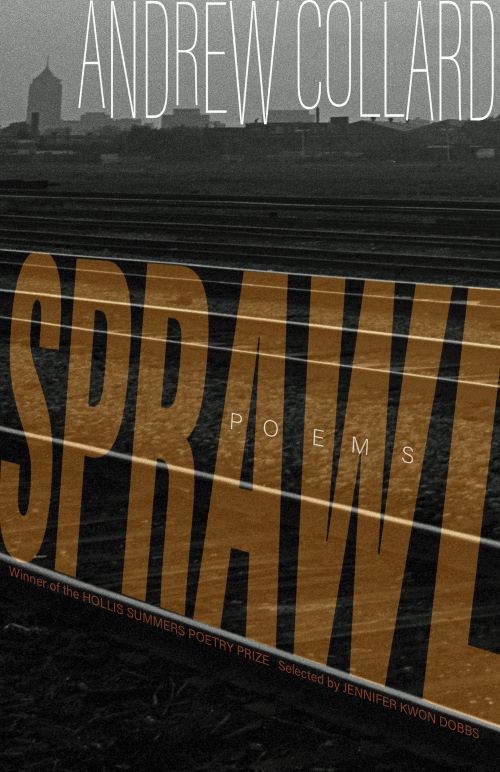Even the scrapyard’s upscale now,with its flag-spangled marquee, the husks of junked carsbarred off like a gated community or the White House—huddling before the newly christened Innovation District‘sclutch of corporate offices, and Jet’s Pizza. Lately, M-59 and Ipass each other like strangers, hundred-thousand-dollarmonuments and signage posing in the median like thirsty policeor a billboard sequence, rapt in praise of a mattress no oneis permitted to sleep on. \\ Beside my Honda, cut scenesof a hundred films wake suddenly into speech: here, the empty lotwhere once my father’s favorite bakery slung rolls fraughtwith cigarette smoke and cinnamon, nothing left now but a namecalling out from the aisles of wholesale clubs and groceries,and here, the Coney Island where my child used to cede our quartersto prize pods every other month in exchange for rubber dinosaursand sticky hands, which lately has renounced its heritageto become another faceless Bar & Grill. \\ Lately, I can’t stop making lists,as though exhaustive cataloging might explain, somehow,what it means that I am from here but can’t afford a home here,in the capital city of controlled entrance. Because to namea thing can be a way to claim it, I take as much as I can carryand run, until the catalog overwhelms my capacity to shapeor make sense of the narrative: Dawn Donuts, debris, Rock-a-Billy’s,debris, Farmer Jack, debris. Only Trinity Lutheran still persists,the final vestige of old Hall Road— \\ The thirty-five-foot-tall golden halo,steel frame coated in aluminum, is wedged before Michigan’s deadliestintersection. It has no history, pyrite glare obscuring border patrolheadquarters, Lakeside Mall, and a thousand offices that don’t carewhat populates them any more than wrapping paper. Roadside,two men with shovels maneuver a struck raccoon into a garbage bagas cars approach, and swerve. Whatever was here beforeTarget doesn’t care. The drive trains of one hundred thousandvehicles per day don’t care. \\ At the food court Magic Wok,my son, fidgeting, knocks his cup of milk across the takeout boxI’ve bought for us to share. While I dry the table, he goes to worksopping up soaked rice and chicken, asks me how much can we save?It’s fifty years since Neil Armstrong set foot on the moon, one handredsince the advent of the assembly line, and a dozen mall birdsroot under tables for garbage meant for nests up in the skylights,a shoot of grass stands through the cracked tile of the fountaindrained of water, and all of its lucky pennies.
Future Ruins
Feature Date
- November 18, 2023
Series
Selected By
Share This Poem
Print This Poem
“Future Ruins” from SPRAWL:POEMS: by Andrew Collard.
Published by Ohio University Press on March 28, 2023.
Copyright © 2023 by Andrew Collard.
All rights reserved.
Reproduced by Poetry Daily with permission.
“‘Because to name / a thing can be a way to claim it,’ Andrew Collard writes in his stunning Sprawl, a poetic geography of the nation’s heartland placed in a metropolitan Detroit that the poet presents as Autotopia, in the age of the Anthropocene that Detroit so mightily helped to create. Powerfully and precisely attentive, beautifully crafted to encompass the imaginative breadth of his witness and vision, Collard’s poems provide us with indispensable ‘field reports from the interior’ with deeply articulate, heartfelt fury.”
—Lawrence Joseph, author of A Certain Clarity: Selected Poems
“Andrew Collard’s Sprawl refuses to shy away from the darkness yet is unafraid to acknowledge the strange beauties which whisper from the depths of fissures and the distances beyond peripheries. Collard captures complexities of contemporary life as the verse maintains its dichotomies, does not water down hardships nor loss. We explore a desperate sort of sadness, such as ‘what it means that I am from here // but can’t afford a home here.’ Yet the work rejects didacticism, instead painting palpable landscapes, places in which we can immerse ourselves for contemplation. These poems zoom into and out from intimate moments, showcasing nuances of public and private topographies. This collection is a superb demonstration of the role of the modern writer as witness to their times.”
—Heather Lang-Cassera, author of Gathering Broken Light, winner of the NYC Big Book Award in Poetry, Social/Political
“I admired the poet’s deeply felt intelligence alert to ‘the way the pieces move.’ The manuscript was an experience that gripped me from the beginning.”
—Jennifer Kwon Dobbs, finals judge
Poetry Daily Depends on You
With your support, we make reading the best contemporary poetry a treasured daily experience. Consider a contribution today.





